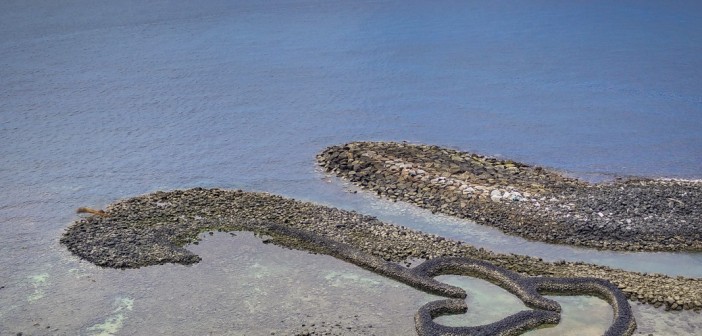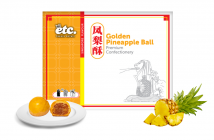I love Taiwan. The first time I visited, my itinerary took me from Taipei to Taroko National Park, down to the coastal town of Hualien before heading back to Taipei to complete the loop. Being a Hokkien Singaporean, I had felt really at home with the cuisine and the language; the people were warm and the entire place seemed to be really tourist friendly. Hence, I was elated to be back again, and this time to check out the Penghu area.
We had lunch in the city of Taichung, where I met up with the media group invited by the Taiwan Tourism Agency for this trip. As I stepped inside themed-restaurant Banana New Paradise, I felt transported in space and time onto the streets in the 1950s and 60s, with familiar facades of old shophouses that can also be seen in the conserved parts of Singapore.
The eatery is also filled with old bicycles, motorcycles and even an old taxi, among other carefully collected items from past eras. At the end of the mock street, I could even see the entrance to a cinema of yesteryear. Even the menu is made to look like a school textbook from decades ago.
After lunch, we also made a pitstop at Miyahara, which used to be an ophthalmology clinic during the Japanese occupation. It is now a concept store which sells ice cream, chocolates and other pastries in intricately printed packaging. Besides, the interesting history of the building, the restored structure feels a lot like the set of Harry Potter, with its tall faux bookshelves, open wooden stairs and Victorian décor. The allure of Miyahara was reflected by the tremendous line outside for its ice-cream. I got to try the seasonal mango flavour, which tasted fresh and natural, without being overly sweetened.
Grandma’s Penghu Bay
Off the west coast of Taiwan, the islands of Penghu form one of 13 counties in Taiwan. Although the archipelago is made up of over 60 islands and islets, just a handful would be of interest to travellers. The region inspired the popular eighties Chinese song “外婆的澎湖湾” (Grandma’s Penghu Bay) by Taiwanese singer Pan An Bang (潘安邦), who was brought up by his maternal grandma on Penghu. After three decades, the same song would inspire another Taiwanese artist, Richie Jen, to write a romantic film set on the beautiful archipelago.
All You Need Is Love
Richie had heard children in the arid northwestern region of Gansu, China, sing the song “Grandma’s Penghu Bay”. He was moved by how the song had transcended boundaries, especially since these children were thousands of miles away from the coast and had grown up surrounded by rocky mountains, were able to immerse themselves with lyrics of “white waves lapping sandy shore”, “coconut groves” and “old sea captain”. Thus inspired, Richie set out to write a screenplay for a romantic comedy set on Penghu. “落跑吧,愛情” (All You Need Is Love) which stars Shuqi and Richie himself, is also his directorial debut.
When asked about the obvious comparisons with Summer Holiday (2000), which was also a romantic comedy set on a beach paradise, Richie explained that the new film is more mature, himself having aged since the first film, and mellower, as the first film was more playful and had a more vibrant and colourful set.
Shuqi plays a Shaanxi girl who was lured to the beach-front homestay operated by Richie’s character, only to realize she had been duped by the glossy photos and “creative” online marketing. After a series of mishaps that stranded her on the island with Richie, sparks flew and … well, you would just have to watch the rest of the movie yourself, since I was only treated to an abridged version of the film that did not reveal the ending.
Against the backdrop of beach and surf, the movie also offers a glimpse of what life on a tiny sunny island might be like for its residents. Fortunately, I was able to experience it myself on Penghu, as Richie offered to play tour guide to the media group over the next two days.
Touring Penghu with Richie Jen
The first day of our itinerary took us around the main four islands that are linked together by bridges. Magong City is linked to the three other townships of Huxi, Baisha and Xiyu overland. The other two townships of Qimei and Wang-an are further away and would require a ferry to access.
The first highlight at Penghu was waiting for the “exodus event”, a walk across to the sea to the islet of Chiyu. As I joined hundreds of visitors waiting on the shores near Kuibishan Geopark, I saw strange ripples appearing in the waters as the tide ebbed away. When the tide had sufficiently receded to reveal a path, someone one sounded a gong to signal it’s safe to cross the waters. I felt the tingle in the air as the masses started waddling into the ankle-deep waters.
The experience was worth the 30 minutes’ wait, with the top of Chiyu offering a great photo-taking spot. It was a good thing that our guide had timed the tides for our itinerary so we did not have to wait too long. The path across is strewed with large black rocks, and may be slippery, so appropriate footwear are advised when visiting the Chiyu Islet.
We were joined by Richie himself for the latter part of the day, where he gave interviews to the media in the Erkan Ancient Residences (二崁古厝). The rustic area of Erkan is a conservation area, and retains the charms of a traditional single-surname village typical from the early 19th century. It was interesting to see how some of the walls in the village were constructed of the remains of corals. I can only imagine how it must be like to explore the maze-like village leisurely, since we had to compete with three busloads of Chinese media present for the film scoops that afternoon.
Day two took us to Qimei Island, about 90 minutes away by ferry. Despite the tragic story of how Qimei got its name, the tiny island is home to one of the more romantic icons of Qimei, one that was also featured in Richie’s new film – the Twin-Hearts Stone Weir.
The stone weir was a traditional fish trap that looks like two intertwined hearts. The Twin-Hearts Stone Weir makes for a romantic photospot, and sufficient number of visitors make the pilgrimage to the landmark such that a rest-stop has sprouted on the cliff overlooking it. I got to try the ubiquitous cactus ice cream there too.
Due to the geography and climate of Penghu, i.e. poor soil and little rain, the agricultural activities are quite limited. Dragon fruit (“pitaya” or “huolonguo”), and related cactus plants seem to have taken well to the archipelago with plenty of sunshine. The locals use what they have. The magenta-coloured cactus ice cream is particularly popular with visitors.
My highlight to Qimei was snorkeling with Richie Jen at Yueli Bay. The shallow bay was teeming with a kaleidoscope of corals, fishes and other sea creatures. Not only did snorkeling at Yueli Bay’s operator seemed safer, with the mandatory wetsuit and life vest, the addition of a guide provided a much richer experience compared with my previous snorkeling experience at Bali.
Instead of letting individuals swim or float around aimlessly, the guide took a group of about six out, with each person holding onto a swim-ring that the he tugged along. Stopping at strategic points, the guide would point out unique corals or other sea creatures on the sea bed below us, and gave a short description of what we were looking at. My favourite part was feeding fishes from my finger tips with bread that the guide handed out.
In addition to the picturesque sights, sunshine and unspoiled beaches, we were treated to excellent seafood every meal, with fresh fishes and shellfish of all sizes in all manners. I never knew the importance of the distinction between species of squids and cuttlefish, until my time on Penghu. It was also strange to learn that fresh vegetables and fruits are often more expensive than seafood on the archipelago! Penghu is no doubt a seafood lover’s paradise.
My two days with Richie seemed ironically hectic with scheduled media activities. I would have loved to spend an extra night over at Qimei, as apparently the Milky Way can be observed with the naked eye due to the lack of light pollution on the island. The extra day or two would have been perfect to explore Penghu fully and to appreciate its idyllic charms — the same charms that inspired a classic-hit song and a potentially hit movie.
How to Get There:
From Singapore, you can fly to Taoyuan International Airport and take a high speed rail train to Taichung (less than an hour). Take a 40-minute domestic flight from Taichung to Penghu. You can use Magong City in Penghu as a base for your activities. Other domestic flights are also available from all major cities on Taiwan.
Watch the trailer of “All You Need is Love” here:




